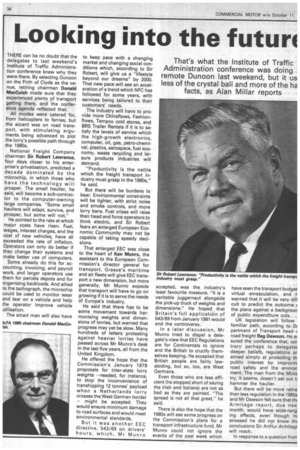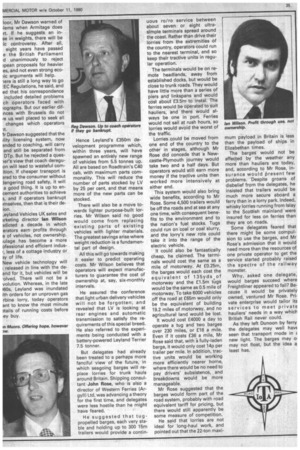Looking into the futurt
Page 36

Page 37

If you've noticed an error in this article please click here to report it so we can fix it.
THERE can be no doubt that the delegates to last weekend's Institute of Traffic Administration conference knew why they were there. By selecting Dunoon on the Firth of Clyde as the venue, retiring chairman Donald MacCuish made sure that they experienced plenty of transport getting there, and the conference agenda reflected that.
All modes were catered for, from helicopters to ferries, but the accent was on road transport, with stimulating arguments being advanced to plot the lorry's possible path through the 1980s.
National Freight Company chairman Sir Robert Lawrence, four days closer to his enterprise's privatisation, predicted a decade dominated by the microchip, in which those who have the technology will prosper. The small haulier, he said, will become a sub-contractor to the computer-owning large companies. "Some small hauliers will adapt, survive, and prosper, but some will not."
He pointed to the rate at which major costs have risen. Fuel, wages, interest charges, and the cost of new vehicles, have all exceeded the rate of inflation. Operators can only do better if they change their systems and make better use of computers.
Some already do this for accounting, invoicing, and payroll work, and larger operators use them for parcels depots and for organising backloads. And allied to the tachograph, the microchip could be used to monitor wear and tear on a vehicle and help the operator improve vehicle to keep pace with a changing market and changing social conditions which, according to Sir Robert, will give us a "lifestyle beyond our dreams" by 2000. That new pace will see an acceleration of a trend which NEC has followed for some years, with services being tailored to their customers' needs.
The industry will have to provide more Chinaflows, Fashionflows, Tempco cold stores, and BRS Trailer Rentals if it is to satisfy the levels of service which the high-growth electronics, computer, oil, gas, petro-chemical, plastics, aerospace, fuel economy, waste recycling and leisure products industries will demand.
"Productivity is the nettle which the freight transport industry must grasp in the 1980s," he said.
But there will be burdens to bear. Environmental constraints will be tighter, with strict noise and smoke controls, and more lorry bans. Fuel crises will raise their head and force operators to think electric, and Sir Robert fears an enlarged European Economic Community may not be capable of taking speedy decisions.
That enlarged EEC was close to the heart of Ken Munro, the assistant to the European Commission's director general for transport. Greece's maritime and air fleets will give EEC transport a new dimension, but more generally, Mr Munro expects that transport will have to go on growing if it is to serve the needs of Europe's industry.
He said that there has to be some movement towards harmonising weights and dimensions of lorries, but warned that progress may yet be slow. Many hundreds of letters protesting against heavier lorries have passed across Mr Munro's desk in the last five years, all from the United Kingdom.
He offered the hope that the Commission's January 1979 proposals for inter-state lorry weights —rpeeded, for instance, to stop the inconvenience of transhipping 12 tonnes' payload when a Netherlands lorry crosses the West German border — might be accepted. They would ensure minimum damage to road surfaces and would meet environmental standards.
But it was another EEC directive, 543/69 on drivers' hours, which, Mr Munro accepted, was the industry's least favourite measure. "It is a veritable juggernaut alongside the pick-up truck of weights and dimensions." He hoped that Britain's full applicatkin of 543/69 from January 1981 would end the controversy.
In a later discussion, Mr Munro tried to dispel a delegate's view that EEC Regulations are for Continentals to ignore and the British to crucify themselves keeping. He accepted that British people are fairly lawabiding, but so, too, are West Germans.
Even those who are less efficient (he stopped short of saying the Irish and Italians) are not as bad as they are painted. "The spread is not all that great," he said.
There is also the hope that the 1980s will see some progress on the Commission's plans for a transport infrastructure fund. Mr Munro could not ignore the events of the past week which have seen the transport budget virtual emasculation, and t warned that it will be very cliff cult to predict the outcome ( the plans against a backgroun of public expenditure cuts.
UK legislation will follow familiar path, according to ID( partment of Transport head c road freight Reg Dawson. He a: sured the conference that, cor trary perhaps to delegate! deeper beliefs, regulations ar aimed simply at protecting th public interest by improvin, road safety and the environ ment. The man from the Minis try, it seems, doesn't set out t1 hammer the haulier.
But there will be more rathe than less regulation in the 1980: and Mr Dawson felt sure that th Armitage report, due nex month, would have wide-rang ing effects, even though h stressed he did not know th conclusions Sir Artliur ArMitag will reach.
In response to a question fror 1r Dawson suggested that the ility licensing system, now anded to coaching, will carry and still be separated from DTp. But he rejected a quesier's view that coach dereguon will lead to wasteful cornition. If cheaper transport is ared to the consumer without langering road safety, it will a good thing. It is up to encement authorities to achieve s, and if operators bankrupt !mselves, then that is their deion.
_eyland Vehicles UK sales and irketing director Ian Wilson adicted a decade in which erators earn profits through e of vehicles, not ownership. iulage has become a more ofessional and efficient indusf, less of a cottage industry or 3y of life.
New vehicle technology will released in line with the deand for it, but vehicles will be 'olved. There will not be a volution. Whereas, in the late 160s, Leyland was inundated ith orders for an unproven gas rbine lorry, today operators ant to know the most minute 3tails of running costs before ey buy. Hence Leyland's £350m development programme which, within three years, will have spawned an entirely new range of vehicles from 5.5 tonnes up. All are based on Roadtrain's C40 cab, with maximum parts commonality. This will reduce the number of parts stocked by LV by 25 per cent, and that means more of the new parts can be stocked.
There will also be a move towards lighter purpose-built lorries. Mr Wilson said no good would come from replacing existing parts of existing vehicles with lighter materials. The greatest savings arise where weight reduction is a fundamental part of design.
All this will go towards making it easier to predict operating costs. Mr Wilson believes that operators will expect manufacturers to guarantee the cost of ownership at, say, six-monthly intervals.
• He assured the conference that light urban delivery vehicles will not be forgotten, and revealed that LV is looking at rear engines and automatic transmission to satisfy the requirements of this special breed. He also referred to the experiments being conducted with a battery-powered Leyland Terrier 7.5 tonner.
But delegates had already been treated to a perhaps more fanciful view of the future, in which seagoing barges will replace lorries for trunk hauls around Britain, Shipping consultant John Rose, who is also a director of Western Ferries (Argyll} Ltd, was advancing a theory for the first time, and delegates were less hostile than he might have feared.
He suggested that tugpropelled barges, each very stable and holding up to 300 15m trailers would provide a contin
uous ro/ro service between about seven or eight ultrasimple terminals spread around the coast. Rather than drive their lorries from the extremities of the country, operators could run to the nearest terminal, and so keep their tractive units in regular operation.
. The terminals would be on remote headlands, away from established docks, but would be close to trunk roads. They would have little more than a series of piers and linkspans and would cost about £3.5m to instal. The ferries would be operated to suit hauliers, and there would always be one in port. Ferries would not sail at rush hours, so lorries would avoid the worst of the traffic.
Lorries could be moved from one end of the country to the other in stages, although Mr Rose did concede that a Newcastle-Plymouth journey would take two and a half days. But operators would still earn more money if the tractive units then worked more intensively at either end.
This system would also bring wide benefits, according to Mr Rose. Some 4,500 trailers would be off the roads and at sea at any one time, with consequent benefits to the environment and to the nation's fuel stocks. Tugs could run on coal or coal slurry, and the lorry's new role could take it into the range of the electric vehicle.
It could also be fantastically cheap, he claimed. The terminals would cost the same as a mile of motorway. At £0.25m, the barges would each cost the equivalent of 1 3 5yds,of motorway and the £1.5m tugs would be the same as 0.5 mile of motorway. To take 6000 vehicles off the road at £65m would only be the equivalent of building 19.2 miles of motorway, and no agricultural land would be lost.
It would cost £4000 a day to operate a tug and two barges over 230 miles, or £18 a mile. Even if it costs £36 a mile, Mr Rose said that, with -a fully-laden barge, it would only cost 14p per trailer per mile. In addition, tractive units would be working more efficiently nearer home, where there would be no need to pay drivers' subsistence, and breakdowns would be more manageable.
Mr Rose suggested that the barges would form part of the road system, probably with road equivalent tariff for pricing, but there would still apparently be some measure of competition.
He said that lorries are not ideal for long-haul work, and pointed out that the 22-ton maxi
mum payload in Britain is less than the payload of ships in Elizabethan times.
The barges would not be affected by the weather any more than hauliers are today, and, according to Mr Rose, insu rance would jiresent few problems. Despite groans of disbelief from the delegates, he insisted that trailers would be much more secure aboard a ferry than in a lorry park. Indeed, whisky lorries running from Islay to the Scottish mainland were insured for less on ferries than they are on roads.
Some delegates feared that there might be some compulsion to use the barges, and Mr Rose's admission that it would need more than the resources of one private operator to get the service started probably raised the spectre of the railway monster.
Why, asked one delegate, would barges succeed where Freightliner appeared to fail? Because it would be privately owned, ventured Mr Rose. Private enterprise would tailor its services to meet private hauliers' needs in a way which British Rail never could.
As they left Dunoon by ferry the delegates may well havE seen that transport mode in z new light. The barges may a may not float, but the idea a least has.












































































































































































